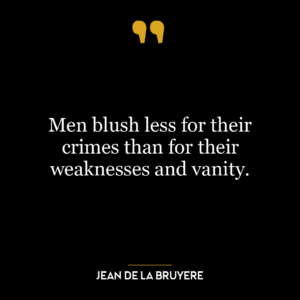The quote "Vanity dies hard; in some obstinate cases it outlives the man" is a profound reflection on the human trait of vanity – an excessive pride in one’s appearance, qualities, abilities, or achievements. The phrase "dies hard" suggests that vanity is not easily relinquished or overcome. It’s a deep-seated aspect of our character that can persist stubbornly, even when we are aware of its negative impact.
The second part of the quote, "in some obstinate cases it outlives the man", takes the idea further. It suggests that vanity can be so ingrained in a person’s identity that it continues to influence perceptions and actions even after the individual has passed away. This could mean that the person’s reputation, actions, or legacy continue to be shaped by their vanity, or that the effects of their vanity continue to impact those around them.
In today’s world, this quote is highly relevant. With the rise of social media, individuals often cultivate an online persona that may be more about projecting a particular image (vanity) than about representing their true selves. This online persona can indeed outlive the person, remaining on the internet indefinitely even after the individual has passed away.
In terms of personal development, this quote serves as a cautionary reminder about the potential dangers of vanity. It suggests that we should strive for authenticity and humility, rather than becoming overly attached to our image or reputation. It also reminds us that our actions can have long-lasting impacts, so we should aim to act in ways that are not solely driven by vanity, but instead reflect our true values and principles.






